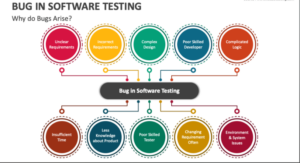The past decade kept the software testers on their toes with the software testing industry taking a steep rise. The pace at which software testing has evolved is mind-boggling and the future looks to witness a much faster pace of growth. The rapid scale of development that the industry is demanding has led to the upscale of skill and is keeping the testers and also the developers on the tenterhooks. As technology develops and the goal of complete digitization takes over the companies the domain of testing is sculpted. With strategies like Agile and DevOps reshaping the testing, the industry has become more flexible and efficient. Under the influence of external and internal factors, the future growth of Strategies in software testing is said to reach new heights with the following strategies.
Artificial Intelligence and machine learning
Currently, AI and ML are two hot grossed topics that are seeing immense utilization in various fields. These two will be two key directories that will continue to shape the future in the same way. Software testing is no exception to this as AI will play a prodigious role in automation. It is a long-predicted tool to make software testing better, faster, and cheaper. Last year it was adopted by QA teams to prioritize the test cases, predict the quality of testing, detect test objects, and interface with the applications that are under test. It is predicted that artificial intelligence in software testing will be established in all the fields that are related to analytics and reports. These will include areas like defect analytics, log analytics, predictive analytics, and coverage of the test requirements.
With increased incorporation of AI, comprehensive education in data science and deep learning will be a part of tester’s skill. The companies will encourage the teams to upskill with AI and ML. acquiring these skills of QA also will increase your demand in the market.
Automation of testing
With a swift rise in the high demand for applications attaining high quality becomes an arduous job. That is when the Strategies in software testing industry switched to automation. Automation has become a fascinating subject in software testing as it minimizes the testing effort and escalates the testing process. As the demand spiked, defects became a part of testing, and automation aided in streamlining the defects and rendering high-quality results. It is said that automation should be deployed carefully as unrealistic automation goals can result in unexpected results. Though automation is being used in companies it will take a new level of transformation in the future.
To expand the scalability of automation codeless test automation is practiced. The codeless automation tool allows the software testers and businesses to automate a test case without caring about the code. This helps to reduce the time consumed in understanding the code. Also apart from this, there is agile automation that drives quality and speed. If you have a QA certification, learning automation will make your wok simpler but it won’t replace manual testing completely.
The internet of things testing
While laying the strategies that will result in the future growth of the software testing it is impossible not to mention IoT. As the number of internet of things devices has increased rapidly, the demand for IoT testing is swelling. As per a leading tech company, the use of IoT will cross 30 billion after 2021. This calls for the use of it in software testing. It introduces its own level of complexity in Strategies in software testing. The integration of the IoTs to the application has to be seamless and at the same time efficient which poses a new set of challenges to the software testers and developers. The QA must educate them to meet the demand and escalate their knowledge in Internet of things integration.
The integration of DevOps
The incorporation of DevOps is an indication that the lines are getting blurred. As the lines of delegations of development and production get blurrier the testers will be testing in the production environment than during the development environment. In the future, the testers have to prepare themselves to work closely with the developers and attain success in the future of blurry lines. DevOps is aimed at empowering the intertwined connection between the tester and developers, reduces the dependent bottlenecks, and above all communication barriers between two teams will be shrunk to a great extent.
In the future teams formed will be more short and well-rounded with optimal resources rather than the large teams that are in existence now. The testers to get visibility in other parts of testing have to be open to learning technical skills. DevOps is still on a surface level but in the future, it will become more sophisticated with the adoption of different tools and technologies.
TcoEs will continue to evolve
In the past few years organizations have been avoiding and moving away from test centers of excellence. But today, it is predicted that there will be a shift towards the test centers of excellence. That TcoEs blended with agility and centralization, the well-monitored testing will aid organizations to obtain greater quality.
Quality assurance as a service
Software services like software as a service, infrastructure as a service, and platform as a service have been a part of the last decade. Now the current era is seeing quality assurance as a service. For the past few this has become a popular track for companies to meet the needs of their software testing. In the future, the companies are trying to stand ahead of the competition.
Performance testing will be replaced by performance engineering
To provide the best user experience to the customers, the software strategy development life cycle is altered right from the beginning. They are now moving to performance engineering from performance testing right from the start of the life cycle.
Bottom line
The future growth predictions of software testing are based on the trends that are existing in the current market. One thing that drives this growth is the skill and expertise of the tester and the QA engineer. They have to adapt to the current trends and expand their knowledge to meet the evolving industry needs.






























One Response